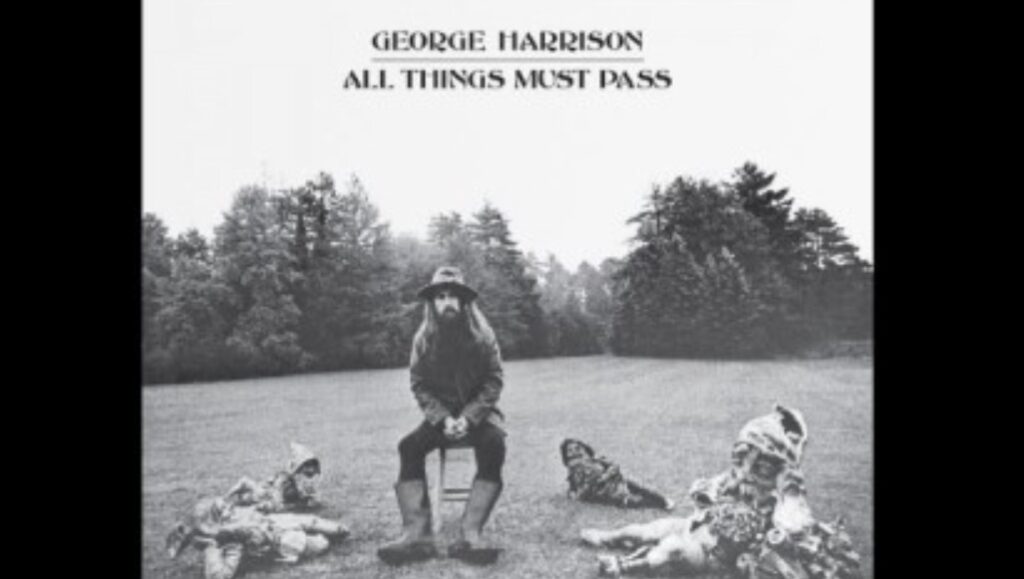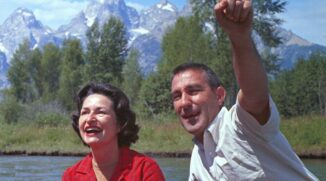
53 years ago today, My Sweet Lord by George Harrison reached number 1 on the UK pop charts. It would hold the same position in the US, Ireland, Canada, Australia, Belgium, Sweden, Switzerland, West Germany, Japan, and others. His first single as a solo artist, the song was the first number-one single by an ex-Beatle. It was also a worldwide call to abandon religious secularism by blending the Hebrew word hallelujah with a Vedic mantra in praise of the Hindu god Krishna. READ more… (1972)

The lyrics of My Sweet Lord reflect Harrison’s often-stated desire for a direct relationship with God, expressed in simple words that all believers could affirm, regardless of their religion.
Harrison was opposed to the release of the song as a single, but relented to Apple Studio’s wishes who believed the triple album All Things Must Pass had at least 3 sure-fire singles on it.
Without the support of any concert appearances or promotional interviews by Harrison, the single’s commercial success was due to its impact on radio, where, Harrison biographer Gary Tillery writes, the song “rolled across the airwaves like a juggernaut, with a commanding presence, much the way Dylan’s Like a Rolling Stone had arrived in the mid-sixties.”
Elton John recalled first hearing My Sweet Lord in a taxi and named it as the last of the era’s great singles: “I thought, ‘Oh my God,’ and I got chills. You know when a record starts on the radio, and it’s great, and you think, ‘Oh, what is this, what is this, what is this?’”
MORE Good News on This Day:
- Composer Franz Schubert was born in Vienna, Austria; perhaps best known for his haunting Ellens dritter Gesang, the beloved melody used today as a setting for the traditional Catholic prayer Ave Maria (1797)
- The US Congress passed the Thirteenth Amendment to the United States Constitution, abolishing slavery, and submitted it to the states for ratification by two-thirds of them (1865)
- 3M began marketing Scotch Tape (1930)
- U.S. President Bill Clinton authorized a $20 billion loan to Mexico to stabilize the country’s economy—money that was paid back in full in 1997, three years earlier than required (1995)
- Myanmar opened its first parliament in more than two decades (2011)
62 years ago today, the infamous Tanganyika (Tanzanian) “laughter epidemic” broke out in the village of Kashasha, Tanzania. The first sign was at an all-girls school when uncontrollable giggles began to occur at such frequency that the teachers had a hard time continuing the lesson. Psychologists believe that it was an outbreak of mass psychogenic illness, of MPI, and it went on in the area for months.

It started with three girls and spread throughout the school, affecting 95 of the 159 pupils, aged 12–18. Symptoms lasted from a few hours to 16 days. The teaching staff were unaffected and reported that students were unable to concentrate on their lessons. The school closed on March 18.
The epidemic spread to Nshamba, a village where several of the girls lived. In April and May, 217 mostly young villagers had laughing attacks. The Kashasha school reopened on May 21 and reclosed at the end of June. In total 14 schools and over 1,000 pupils were affected by fits of hysterical laughter and uncontrollable giggling.
Some scientists remain adamant this was a stress response, and that in the same way a mob mentality arises during a riot, the infectious laughter transmitted other symptoms such as crying. In 1962, Tanganyika had just won its independence, and one of the prevailing theories is that the increased pressure to succeed in school caused a kind of mass nervous breakdown, however all research into the topic was observational, and contagious laughter that releases hormones like dopamine has been observed in more scientific settings. (1962)
27 years ago today, one of the most impactful video games in history, Final Fantasy VII was released on the Sony Playstation. Always near the top of any discussion of the greatest video game ever, FF7 revolutionized what a game could be—namely an equivalent to great works of literature in which one acts out the characters’ choices rather than observing them in words. It was the first video game to introduce that kind of storytelling depth, one of the first to compliment gameplay with exceptional music, and the first mega-dose of Japanese animation culture to American audiences. It sold 13.3 million copies; the soundtrack alone sold 180,000 copies and has been named the greatest video game of all time by multiple publications.

A role-playing game, FF7 focuses on the story of Cloud Strife, a mercenary hired by an eco-terrorist organization to stop a world-controlling megacorporation from using the planet’s life essence as an energy source. An awfully relevant plot in today’s climate-climate. Events send Cloud and his allies in pursuit of Sephiroth, a former member of the corporation who seeks to destroy the planet. Sephiroth is regarded as one of video game history’s most impactful villains, and the scene in FF7 in which he strikes down the female protagonist, with little warning, is considered one of the most significant character deaths in video gaming, a difficult feat since most video games involve violence to some degree.
After its release, GameSpot commented after its release that “never before have technology, playability, and narrative combined as well as in Final Fantasy VII,” and that FF7 was “the RPG that would influence every role-playing game that would follow.” In 2005 Electronic Gaming Monthly said it was “the first RPG to surpass, instead of copy, movielike storytelling” and taught gamers “how to cry.” (1997)
And, Happy 43rd Birthday to singer, actor, and record producer Justin Timberlake. Born to a gospel choir director in 1981 in Tennessee, Timberlake’s pop albums and other talents have won him more than a dozen Grammy and Emmy awards—including, for his comedy sketches while hosting Saturday Night Live. He later gained notoriety on the big screen when he co-starred in The Social Network. (1981)

103 years ago today, the 3-time Tony Award-winning musical-comedy performer, Carol Channing was born.

She was best known for her unique girlish voice and comedic timing used to great effect when she starred in Hello, Dolly! and Gentlemen Prefer Blondes. An ovarian cancer survivor, she wrote a 2002 autobiography, Just Lucky I Guess, and she was featured in a 2012 documentary, entitled Larger Than Life. In 2003, she married her junior-high-school sweetheart, who reunited with her after she mentioned him fondly in her memoir. She died on January 15, 2019, in Rancho Mirage, California. (1921–2019)
104 years ago today, Arizona Congressman Stewart Udall was born. He became Secretary of the Interior from 1961 to 1969 and saved millions of acres of wilderness and waterways.

Under his leadership, the US government expanded federal public lands, adding four national parks, six national monuments, eight national seashores and lakeshores, nine recreation areas, 20 historic sites, and 56 national wildlife refuges—including Canyonlands National Park in Utah, North Cascades National Park in Washington, Redwood National Park in California, the Great Swamp National Wildlife Refuge, and the Appalachian Scenic Trail stretching from Georgia to Maine. (1920-2010)
Along with his brother, Rep. “Mo” Udall (D–AZ), Stewart played a key role in the enactment of many environmental laws such as the Clear Air, Water Quality, and Clean Water Restoration Acts and Amendments, the Wilderness Act of 1964, the Endangered Species Preservation Act of 1966, the Land and Water Conservation Fund Act of 1965, the Solid Waste Disposal Act of 1965, the National Trail System Act, and Wild and Scenic Rivers Act.
And, 105 years ago, baseball hero Jackie Robinson was born in Cairo, Georgia. He made history in 1947 as the first black baseball player to appear in a Major League game. Despite experiencing terrible racism from players and fans around him, Jackie stayed mostly graceful and earned peoples’ admiration–both on and off the field. Athletically, he performed magnificently and won the Rookie of the Year award. Two years later, he won the MVP award, with a .342 batting average. Following a storied career, his Dodger jersey number—42—was retired in tribute leaguewide by every club.
His remarkable life story has been told in books and pictures—especially notable is the Hollywood film 42, starring Chadwick Boseman. Documentary filmmaker Ken Burns produced a 4-hour series for PBS. WATCH a video… (1919)
SHARE the Milestones, Memories, and Music…